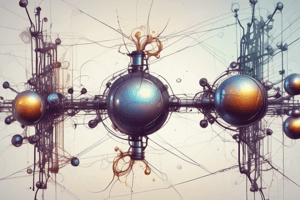Podcast
Questions and Answers
Which of the following metals reacts with cold water to form a metal hydroxide and hydrogen gas?
Which of the following metals reacts with cold water to form a metal hydroxide and hydrogen gas?
- Iron
- Gold
- Potassium (correct)
- Copper
Gold is considered a very reactive metal.
Gold is considered a very reactive metal.
False (B)
What product is formed when a reactive metal reacts with an acid?
What product is formed when a reactive metal reacts with an acid?
Salt and hydrogen gas
The reaction of a metal with oxygen produces a __________.
The reaction of a metal with oxygen produces a __________.
Match the following metals with their reactivity:
Match the following metals with their reactivity:
Which method involves plants absorbing metal compounds through their roots?
Which method involves plants absorbing metal compounds through their roots?
The less reactive a metal is, the more resistant it is to oxidation.
The less reactive a metal is, the more resistant it is to oxidation.
What environmentally harmful activity is associated with mining ores?
What environmentally harmful activity is associated with mining ores?
Bacteria produce solutions called _______ that contain absorbed metal compounds.
Bacteria produce solutions called _______ that contain absorbed metal compounds.
Match the extraction methods with their descriptions:
Match the extraction methods with their descriptions:
What is the main advantage of recycling metals?
What is the main advantage of recycling metals?
Life cycle assessment (LTA) is a strictly objective process.
Life cycle assessment (LTA) is a strictly objective process.
What is the relationship between a metal's resistance to oxidation and its position in the reactivity series?
What is the relationship between a metal's resistance to oxidation and its position in the reactivity series?
Extracting and processing raw materials, manufacturing and packaging, use and ______, and disposal are stages considered in a life cycle assessment.
Extracting and processing raw materials, manufacturing and packaging, use and ______, and disposal are stages considered in a life cycle assessment.
What is one negative environmental impact of mining?
What is one negative environmental impact of mining?
Which of the following metals can be extracted from their oxides by reduction with carbon?
Which of the following metals can be extracted from their oxides by reduction with carbon?
Oxidation is defined as the gain of electrons.
Oxidation is defined as the gain of electrons.
Name two metals that are found in the reactivity series and are more reactive than hydrogen.
Name two metals that are found in the reactivity series and are more reactive than hydrogen.
The process where a more reactive metal displaces a less reactive metal from a compound is known as __________.
The process where a more reactive metal displaces a less reactive metal from a compound is known as __________.
Match the following metals with their extraction method:
Match the following metals with their extraction method:
What happens to more reactive metals during displacement reactions?
What happens to more reactive metals during displacement reactions?
Less reactive metals undergo oxidation when displaced in a chemical reaction.
Less reactive metals undergo oxidation when displaced in a chemical reaction.
Which method is used to extract metals that are more reactive than carbon?
Which method is used to extract metals that are more reactive than carbon?
In a reactivity series, a more reactive metal can displace a less reactive metal from its __________.
In a reactivity series, a more reactive metal can displace a less reactive metal from its __________.
Match the following reactions with their descriptions:
Match the following reactions with their descriptions:
Which metal is considered very unreactive and is often found in its natural form in the Earth's crust?
Which metal is considered very unreactive and is often found in its natural form in the Earth's crust?
Electrolysis is a cheap method for extracting metals from their ores.
Electrolysis is a cheap method for extracting metals from their ores.
What is formed when a more reactive metal oxidizes?
What is formed when a more reactive metal oxidizes?
Oxidation is the __________ of oxygen, while reduction is the __________ of oxygen.
Oxidation is the __________ of oxygen, while reduction is the __________ of oxygen.
Match the following terms with their definitions:
Match the following terms with their definitions:
Flashcards
Reactivity of metals with water
Reactivity of metals with water
Metals react with cold water to produce a metal hydroxide (an alkaline solution) and hydrogen gas. For example, potassium reacts with water to form potassium hydroxide and hydrogen gas: 2K + 2H2O -> 2KOH + H2.
Reactivity of metals with acids
Reactivity of metals with acids
Fairly reactive metals react with acids to produce a salt and hydrogen gas. For example, zinc reacts with hydrochloric acid to form zinc chloride and hydrogen gas: Zn + 2HCl -> ZnCl2 + H2
Reactivity of metals with oxygen
Reactivity of metals with oxygen
Almost all metals react with oxygen to form a metal oxide. More reactive metals react with oxygen more quickly.
Gold's special reactivity
Gold's special reactivity
Signup and view all the flashcards
Deduction of relative reactivity of metals
Deduction of relative reactivity of metals
Signup and view all the flashcards
Electrolysis Extraction
Electrolysis Extraction
Signup and view all the flashcards
Phytoextraction
Phytoextraction
Signup and view all the flashcards
Bacterial Extraction
Bacterial Extraction
Signup and view all the flashcards
Metal Reactivity and Oxidation
Metal Reactivity and Oxidation
Signup and view all the flashcards
Why is Metal Recycling Important?
Why is Metal Recycling Important?
Signup and view all the flashcards
Life Cycle Assessment (LCA)
Life Cycle Assessment (LCA)
Signup and view all the flashcards
Life Cycle Assessment Stages
Life Cycle Assessment Stages
Signup and view all the flashcards
LCA Considerations
LCA Considerations
Signup and view all the flashcards
LCA Challenges
LCA Challenges
Signup and view all the flashcards
LCA Misuse
LCA Misuse
Signup and view all the flashcards
Reactivity of a metal
Reactivity of a metal
Signup and view all the flashcards
Reactivity series
Reactivity series
Signup and view all the flashcards
Displacement reactions
Displacement reactions
Signup and view all the flashcards
Redox reactions in metal displacement
Redox reactions in metal displacement
Signup and view all the flashcards
Oxidation
Oxidation
Signup and view all the flashcards
Reduction
Reduction
Signup and view all the flashcards
Occurrence of metals
Occurrence of metals
Signup and view all the flashcards
Extraction of metals using carbon
Extraction of metals using carbon
Signup and view all the flashcards
Extraction of metals using electrolysis
Extraction of metals using electrolysis
Signup and view all the flashcards
Factors affecting metal extraction
Factors affecting metal extraction
Signup and view all the flashcards
Reactivity series: Metals
Reactivity series: Metals
Signup and view all the flashcards
Extraction of iron
Extraction of iron
Signup and view all the flashcards
Extraction of aluminum
Extraction of aluminum
Signup and view all the flashcards
Extraction methods: Reactivity
Extraction methods: Reactivity
Signup and view all the flashcards
Extraction methods: Cost
Extraction methods: Cost
Signup and view all the flashcards
Study Notes
Extracting Metals and Equilibria
-
Metal Reactivity and Reactions:
- Highly reactive metals react with cold water, forming metal hydroxides (alkaline solutions) and hydrogen gas (e.g., 2K + 2H₂O → 2KOH + H₂).
- Moderately reactive metals react with acids, producing a salt and hydrogen gas.
- Almost all metals react with oxygen to form metal oxides; more reactive metals react faster.
- Gold is extremely unreactive and does not react with any of these.
- Metal reactivity is determined by reactions with water, acids, and oxygen. Observe bubbles for hydrogen production.
-
Metal Displacement Reactions:
- A more reactive metal can displace a less reactive metal from a solution of its salt.
- The more reactive metal is oxidized (loses electrons, forming a cation), and the less reactive metal is reduced (gains electrons, forming an atom).
- Example: A more reactive metal immersed in a salt solution containing a less reactive metal will gradually disappear as it forms a solution; the less reactive metal will coat the surface.
-
Reactivity Series:
- Metals can be arranged in a reactivity series based on their tendency to form positive ions.
- More reactive metals can form cations more easily.
- The reactivity series includes potassium, sodium, calcium, magnesium, aluminium, zinc, iron, hydrogen, copper, silver, and gold.
- Reactivity can be determined by testing reactions with water and dilute acids.
- Non-metals like hydrogen and carbon are often included in the reactivity series.
Extraction of Metals
-
Metal Extraction Methods:
- Most metals are extracted from ores.
- Unreactive metals are found as uncombined elements in the Earth's crust.
- The extraction method depends on the metal's position in the reactivity series and the cost.
-
Reduction with Carbon:
- Metals less reactive than carbon can be extracted from their oxides by reduction with carbon.
- Carbon gains oxygen (oxidized), and the metal oxide loses oxygen (reduced).
- Examples include iron extraction (2Fe₂O₃ + 3C → 4Fe + 3CO₂).
- Requires high temperatures (blast furnace for iron).
-
Electrolysis:
- Metals more reactive than carbon are extracted by electrolysis of molten compounds.
- Electrolysis is costly due to high energy use.
- Aluminium is extracted this way (electrolysis of molten aluminium oxide and cryolite).
-
Other Extraction Methods:
- Phytoextraction: Plants absorb metal compounds, concentrate them in shoots/leaves, and the plant material can be burned to produce metal compounds.
- Bacterial Extraction: Bacteria absorb metal compounds, producing leachates that can be used to obtain the metal.
Oxidation and Reduction
-
Oxidation:
- Gain of oxygen
- Loss of electrons
-
Reduction:
- Loss of oxygen
- Gain of electrons
Recycling Metals
- Recycling Advantages:
- Conserves environment resources
- Cost effective energy-wise than extracting from ores
- Reduces mining damage (noise, dust).
- Saves valuable raw materials.
Life Cycle Assessment (LCA)
- Life Cycle Assessment (LCA):
- A process for assessing the environmental impact of a product throughout its entire life cycle.
- Stages include: raw material extraction, manufacturing, use, and disposal.
- Quantification of water, energy use, and waste production is relatively straightforward.
- Assigning values to pollutant effects requires value judgments and is not completely objective.
- Selective or abbreviated LTAs can be used but must be used responsibly.
Studying That Suits You
Use AI to generate personalized quizzes and flashcards to suit your learning preferences.
Description
Explore the fascinating world of metal reactivity and displacement reactions in this quiz. Understand how different metals interact with water, acids, and oxygen, and learn about the principles of oxidation and reduction. Test your knowledge on metal hydroxides, hydrogen production, and more.




